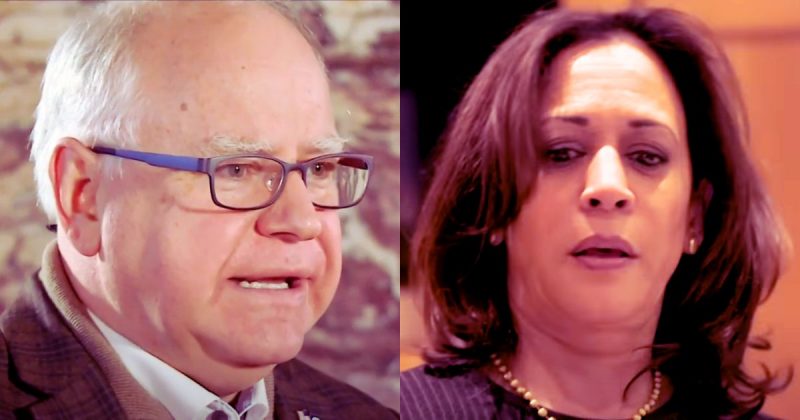Former Vice President Kamala Harris has revealed new details about her selection of Minnesota Gov. Tim Walz as her 2024 running mate.
In her newly released book, 107 Days, Harris shared insights into the decision-making process behind choosing Walz over other contenders, including Gov. Josh Shapiro (D-PA) and Sen. Mark Kelly (D-AZ).
Harris released 107 Days on Tuesday, calling it her account of running what she described as the shortest presidential campaign in modern history.
The book includes her behind-the-scenes perspective on the candidate interviews, her private reflections and her ultimate decision.
Harris said her team narrowed down the running mate pool to three finalists: Shapiro, Walz and Kelly.
Each candidate, according to Harris, brought a distinct style and set of strengths, but also challenges she believed would affect her campaign.
Of Walz, Harris noted that his authenticity stood out immediately.
She recalled that in his interview, “It was quickly clear to me that Tim had walked into that room feeling he wouldn’t get the job.”
She recounted that the first words Walz said were: “Whether or not you pick me, I’m going to do everything I can to get you elected.”
Harris said this established the tone of the conversation and revealed a level of loyalty she found reassuring.
Harris described Walz as “immediately self-critical.”
She quoted him saying, “I’m not a good debater” and “I’ve never used a teleprompter.”
She contrasted this self-deprecating style with others in politics who she said only appeared to act modest.
“He was less polished than Josh,” Harris wrote. “But he had an appealing authenticity and was genuinely self-deprecating.”
“A lot of people in politics act self-deprecating, but it’s just that, an act. If anything, Tim over-indexed his own liabilities.”
Harris added that Walz did not present himself as a political climber.
“He said he had no ambition to be president, that his aim as vice president would be doing meaningful work to improve people’s lives,” she wrote.
For Harris, this stood out because she saw unchecked ambition as a risk in a running mate.
“It’s no bad thing for a vice president to want to be president, unless that ambition plays a corrosive role in the relationship and causes disloyalty,” she stated.
“That wouldn’t be an issue with Tim.”
Walz, according to Harris, had “no fixed ideas about what the role of vice president should be, saying he would do whatever I found was most useful for him to do.”
She said this flexibility made him an attractive partner on the ticket.
In contrast, Shapiro’s interview impressed her but raised other concerns.
Harris described him as “poised, polished, and personable.”
She wrote that she admired his work, calling him “a wonderful campaigner, very compelling and very bright.”
The two spoke about the importance of Pennsylvania, a key battleground state, and also discussed Shapiro’s past public statements about his support for Israel.
Harris noted that while Shapiro was confident, he asked numerous questions about the vice president’s role.
“He peppered me with questions, trying to nail down, in detail, what role I saw for my VP,” Harris recalled.
At one point, she said, Shapiro mused that he would want “to be in the room for every decision.”
Harris told him directly that such an expectation was “unrealistic,” explaining, “A vice president is not a copresident.”
She admitted she left the meeting with a lingering concern about Shapiro’s ability to accept a supporting role.
“I had a nagging concern that he would be unable to settle for a role as number two and that it would wear on our partnership,” Harris wrote.
Her concerns extended into her reflections on the presidency itself.
“‘Every day as president,’” she said, “‘I’ll have ninety-nine problems, and my VP can’t be one.’”
When considering Kelly, Harris raised questions about his ability to handle the adversarial nature of a presidential campaign.
She wrote that his relative inexperience in politics could leave him vulnerable.
“Could a captain, used to deference and respect, adapt to an opponent’s national campaign specifically designed to disrespect him, to cut a hero down to something small?” Harris asked.
According to Harris, most of her inner circle leaned toward Walz as the strongest choice.
To get a younger perspective, she consulted her 17-year-old godson, whom she described as a “creature of the zeitgeist.” He also favored Walz.
Her husband, former second gentleman Doug Emhoff, leaned toward Shapiro, pointing to his longer relationship with him.
Despite his preference, Harris emphasized that she needed to make the decision independently.
“It was always going to have to be my decision,” she wrote.
Harris described how she decided to step back from the discussions and clear her head by cooking, the Daily Caller outlined.
“I told my staff and family that I didn’t want any more input, and I went to do something practical: I made a tasty rub and seasoned a pork roast.”
She concluded the chapter by explaining that by the end of that evening, she had made her choice.
“By the time I went to bed, I’d decided on Walz.”

